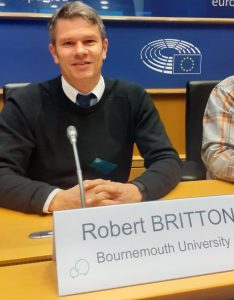I was invited to be a panel member and speaker on a forum on the role of recreational angling in biodiversity protection and restoration held at the European Parliament this week. Chaired by Niclas Herbst MEP, with representatives from organisations including the European Angling Alliance, plus MEPs and their aides (e.g. from DG Environment), the Forum discussed the contribution of recreational angling to sustainable biodiversity within Europe, including how angling activities align with a number of European Directives (e.g. Water Framework Directive, Invasive Alien Species Regulation, Common Fisheries Policy reforms) and the European Biodiversity Action Plan. This Forum was also timely, given widespread concern over substantial declines in freshwater fish diversity and abundance across the world.
I outlined that approximately 10% of the world’s population have recently engaged with recreational angling, with approximately 24 million anglers in Europe, who contribute both financially (e.g. licence fees) and through volunteer based activities that, in combination, provide the resources needed for many conservation initiatives to run. In return, angling is recognised as being good for human well-being and the mental health of individuals as it reconnects people with nature. Using examples from our work in the Research Cluster in Fish Ecology and Conservation, I discussed how recreational anglers contribute strongly to protecting and restoring biodiversity through: (i) adopting catch and release angling (C&R) when targeting threatened species, as this maintains fishery access and socio-economic values, and results in negligible fish mortality when good angling practices are used (and C&R soon becomes the social norm where most, if not all, fish are returned alive post-capture); (ii) the provision of long-term catch data to support the management and conservation of data-poor species, as demonstrated by our REF2021 Impact case study on saving a critically endangered fish species from extinction; and (iii) how anglers act as citizen scientists, for example, by generating data on biological water quality that supports statutory assessments. Moreover, effective implementation of regulation and education can then manage angling activities that are potentially harmful to biodiversity (e.g. releases of alien species).
Overall, the forum highlighted to MEPs the role that angling can play in helping support a better environment, including where evidence based science can help inform angling practices and ensure fisheries management activities promote sustainable biodiversity.

Rob Britton at the Recreational Fishing Forum at the European Parliament
 Academic Targeted Research Scheme (Sustainability, Impact and Consumption): Predator ecology and conservation
Academic Targeted Research Scheme (Sustainability, Impact and Consumption): Predator ecology and conservation










 On Christmas Day in the Morning…
On Christmas Day in the Morning… New Nepal scoping review on maternal & neonatal health
New Nepal scoping review on maternal & neonatal health Fourth INRC Symposium: From Clinical Applications to Neuro-Inspired Computation
Fourth INRC Symposium: From Clinical Applications to Neuro-Inspired Computation Writing policy briefs
Writing policy briefs ECR Funding Open Call: Research Culture & Community Grant – Application Deadline Friday 12 December
ECR Funding Open Call: Research Culture & Community Grant – Application Deadline Friday 12 December MSCA Postdoctoral Fellowships 2025 Call
MSCA Postdoctoral Fellowships 2025 Call ERC Advanced Grant 2025 Webinar
ERC Advanced Grant 2025 Webinar Horizon Europe Work Programme 2025 Published
Horizon Europe Work Programme 2025 Published Horizon Europe 2025 Work Programme pre-Published
Horizon Europe 2025 Work Programme pre-Published Update on UKRO services
Update on UKRO services European research project exploring use of ‘virtual twins’ to better manage metabolic associated fatty liver disease
European research project exploring use of ‘virtual twins’ to better manage metabolic associated fatty liver disease